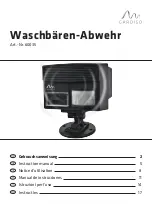
CHAPTER 16 SERIAL INTERFACES CSI10 AND CSI11
Preliminary User’s Manual U17260EJ3V1UD
388
16.3 Registers Controlling Serial Interfaces CSI10 and CSI11
Serial interfaces CSI10 and CSI11 are controlled by the following four registers.
•
Serial operation mode register 1n (CSIM1n)
•
Serial clock selection register 1n (CSIC1n)
•
Port mode register 0 (PM0) or port mode register 1 (PM1)
•
Port register 0 (P0) or port register 1 (P1)
(1) Serial operation mode register 1n (CSIM1n)
CSIM1n is used to select the operation mode and enable or disable operation.
CSIM1n can be set by a 1-bit or 8-bit memory manipulation instruction.
Reset signal generation sets this register to 00H.
Remark
n = 0:
µ
PD78F0531, 78F0532, 78F0533
n = 0, 1:
µ
PD78F0534, 78F0535, 78F0536, 78F0537, 78F0537D
Figure 16-3. Format of Serial Operation Mode Register 10 (CSIM10)
Address: FF80H After reset: 00H R/W
Note 1
Symbol
<7>
6 5 4 3 2 1 0
CSIM10
CSIE10
TRMD10
0
DIR10
0 0 0
CSOT10
CSIE10
Operation control in 3-wire serial I/O mode
0
Disables
operation
Note 2
and asynchronously resets the internal circuit
Note 3
.
1
Enables
operation
TRMD10
Note 4
Transmit/receive
mode
control
0
Note 5
Receive mode (transmission disabled).
1
Transmit/receive
mode
DIR10
Note 6
First
bit
specification
0
MSB
1
LSB
CSOT10
Communication
status
flag
0
Communication is stopped.
1
Communication is in progress.
Notes 1.
Bit 0 is a read-only bit.
2.
To use P10/SCK10/T
X
D0 and P12/SO10 as general-purpose ports, set CSIM10 in the default status
(00H).
3.
Bit 0 (CSOT10) of CSIM10 and serial I/O shift register 10 (SIO10) are reset.
4.
Do not rewrite TRMD10 when CSOT10 = 1 (during serial communication).
5.
The SO10 output (see
(a)
in
Figure 16-1
) is fixed to the low level when TRMD10 is 0. Reception is
started when data is read from SIO10.
6.
Do not rewrite DIR10 when CSOT10 = 1 (during serial communication).
Caution Be sure to clear bit 5 to 0.















































